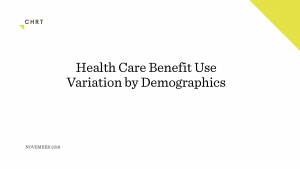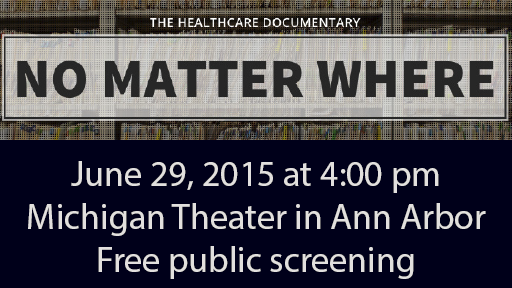Co-authors
- Leah Corneail, Health Policy Analyst and CHRT Policy Fellowship Program Manager
- Josh Fangmeier, Senior Health Policy Analyst
November 1st of this year marked the beginning of the Affordable Care Act’s third marketplace open enrollment period. As consumers, health plans, and exchanges prepared for open enrollment, much of the current health policy debate shifted from reducing the number of uninsured Americans to how best to manage the growth in out-of-pocket expenses. In September, the Kaiser Family Foundation/Health Research & Education Trust 2015 Employer Health Benefits Survey found that the average deductible for covered workers increased 67 percent since 2010, significantly more than the increase in both premiums and wages. According to the Health Care Cost Institute, average out-of-pocket spending was $810 per person with employer-sponsored insurance in 2014.
These trends have prompted presidential candidates Hillary Clinton and Bernie Sanders to make cost-sharing controls a priority. Clinton recently proposed required coverage for three physician office visits per year without cost-sharing, a new limit on out-of-pocket spending on certain drugs, and tax credits for consumers with high out-of-pocket spending relative to income.
Consumers who experience large out-of-pocket costs are often considered to be “underinsured,” since their insurance coverage may not provide adequate protection from large medical expenses. The Commonwealth Fund defines the underinsured through two income thresholds: residents with health insurance in families below 200 percent of the federal poverty level (FPL) with out-of-pocket medical spending (excluding premiums) that exceed 5 percent of family income; or, 10 percent if family income is above 200 percent of FPL.
In August 2015, at the Center for Healthcare Research and Transformation (CHRT), we published an issue brief that provided baseline characteristics of Michigan’s underinsured population in 2013, just prior to the ACA’s coverage expansion. To measure underinsurance, we used the Commonwealth Fund definition and found that more Michiganders were underinsured (1.2 million) than uninsured (1 million) in 2013, and underinsurance was concentrated in certain populations, particularly low-income residents and those with certain forms of health insurance. Among those with private insurance, the underinsurance rate was nearly four times greater for those who directly purchased coverage on the individual (private, non-group) market as those enrolled in group coverage through an employer.
Challenges of Measuring Underinsurance
Compared to tracking the number of uninsured Americans, underinsurance is a difficult concept to define and measure. High levels of predictable out-of-pocket spending may be a financial burden for insured individuals, but it may not be a sign of too little insurance, since the purpose of insurance is to reduce the economic risk of catastrophic health shocks. Focusing on financial burden, people with health insurance could be considered underinsured if they require services not covered by their plan; forgo necessary care due to the co-pays and deductibles they would face; or if they experience high out-of-pocket costs for the care they do receive. The definition used by the Commonwealth Fund and CHRT only takes the last of these situations into account when measuring underinsurance. The Commonwealth Fund’s two-tiered threshold to determine underinsurance does take into account the consideration that a higher percentage of income going towards medical bills may be less burdensome for higher income individuals. However, it does not adjust for the economic risk insured individuals may face or account for individuals who forgo necessary care due to high cost-sharing.
Surveys indicate that nearly 20 million insured individuals in 2012 did not receive or delayed seeking medical care within the year due to costs. While some of this population may have also experienced large out-of-pocket spending, only measuring out-of-pocket costs relative to income leads to conservative underinsurance estimates. In addition, some insured individuals experience the combination of high out-of-pocket costs and delayed necessary care. In a 2014 survey, the Commonwealth Fund found that about one-quarter of underinsured adults reported having to change their way of life to pay medical bills, and underinsured adults were twice as likely to report not getting needed care because of cost in the past year, compared to adequately insured adults. While high medical spending can cause financial difficulties for consumers, forgone care is also an important issue to understand and measure.
Among the underinsured identified in our study, half were enrolled in employer-based coverage, but a substantial share had public insurance and were not subject to the rising deductibles of private coverage. For example, we found that almost 25 percent of Michigan residents enrolled in either Medicaid or the Children’s Health Insurance Program (CHIP) were in underinsured families in 2013. On its face, this is a surprising result, since federal Medicaid law limits beneficiary premiums and out-of-pocket spending to 5 percent of family income (effectively below the underinsured definition). While the complete explanation for this finding is not clear, there are multiple factors that likely contributed, including Medicaid benefit caps or other coverage limitations and mixed sources of coverage in low-income families.
For example, half of the Medicaid/CHIP beneficiaries who were underinsured in 2013 had at least one family member not covered by Medicaid/CHIP. This means that while one person in a family may be enrolled in Medicaid/CHIP, other family members were either uninsured or had another form of health insurance. Thus, while the Medicaid beneficiary in the family had financial protection in the form of the 5 percent cap on out-of-pocket spending, other family members may have had deductibles and other medical costs that were high enough compared to total family income that the whole family was considered underinsured. Notably, the Medicaid underinsured population we observed was before implementation of ACA’s Medicaid expansion in Michigan with its own explicit cost-sharing requirements approved through a federal waiver. Due to these circumstances, it is not clear how comparable underinsurance is for the publicly and privately insured.
Opportunities for Further Research
More than 17 million people have gained insurance since the ACA’s coverage expansions took effect in 2014. The ACA includes several provisions designed to help reduce consumer out-of-pocket spending, including cost-sharing reductions for low-income marketplace enrollees, maximum out-of-pocket spending caps on most private insurance plans, and first-dollar coverage for certain preventive services. It is too soon to understand how the ACA will affect underinsurance among both newly and previously insured individuals, but the continued growth in employer-sponsored deductibles likely means that the issue of underinsurance will not go away anytime soon.
As out-of-pocket spending continues to grow, there are certainly opportunities for researchers to develop more comprehensive and nuanced definitions of underinsurance to better examine the challenges and characteristics of this population. Not all underinsured residents are the same or experience the same degree of hardship, so it would be helpful to identify various degrees of underinsurance. This distinction could recognize how the underinsured experience can vary by source of insurance coverage and other characteristics, similar to how researchers on uninsurance developed distinctions between the short-term and long-term uninsured.



 In Health Affairs’ GrantWatch column, Marianne Udow-Phillips, Kathryne O’Grady, and Phyllis Meadows share Nine lessons for the leaders of health and human services integration initiatives (and for the grantmakers that want them to succeed).
In Health Affairs’ GrantWatch column, Marianne Udow-Phillips, Kathryne O’Grady, and Phyllis Meadows share Nine lessons for the leaders of health and human services integration initiatives (and for the grantmakers that want them to succeed).

 CHRT, in partnership with six
CHRT, in partnership with six